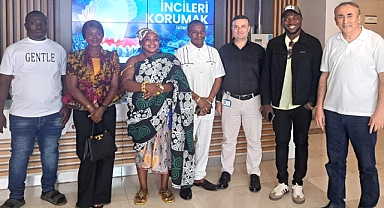Knowledge is the source of the experiences, lessons, tested or untested teachings stored in human memory. The greatest characteristic of knowledge is that it acts as an energy source that carries humanity into the future, enabling us to design our future based on the knowledge of the past. If the information stored in memory is false or manipulated, the future you design will also be false and manipulated, reflecting how others want you to be seen. We must escape the phenomenon of information pollution, also known as disinformation, and design our future accordingly. It is essential that we convey the correct information to future generations under all circumstances.
The topic of our discussion, the Knowledge Economy, will reveal how our nation and society are perceived globally based on the work we do with accurate information. If the perception is of a strong economy and social governance, then the source of the information is deemed accurate. If the perception is negative, both economically and socially, it implies that the information is incorrect or manipulated, indicating a problem in the interpretation of the information.
One of the most important issues in both this age and the past is the overwhelming bombardment of information on individuals. The purpose for which information is instilled in individuals and society has become increasingly significant. It is widely known that many pieces of information, once accepted as true, have later been proven to be false or manipulated.
All our observations and assumptions about natural and social events, both internal and external to us, form the foundation of knowledge. If we speak of development, it is clear that we are also speaking of change. Therefore, without understanding the concept of change, it is impossible to say much about knowledge and its economy. During times of change, boundaries are crossed. Society reorganizes itself; its worldview, core values, social and political structure, art, and key institutions evolve.
This shows us that the people of our era have set sail for new historical, political, and cultural levels of development and will continue to do so every few decades or centuries. Developing countries must initiate a transition to a knowledge society by altering their development strategies. Instead of industrialization strategies based on adopting outdated technologies discarded by developed countries, they must shift to innovative strategies that revive the dynamism of the knowledge society and knowledge technologies, and develop policies to achieve this.
If this is done, it is possible that within the next ten or twenty years, surprising economic miracles could occur. Even underdeveloped (or, as I believe, left behind) countries such as those in Africa, and the poor and underdeveloped nations of the third world, could undergo rapid transformations, becoming swiftly growing economic powers in the blink of an eye.
We are likely living through the final stages of such a transformation right now. The previous transformations were inevitably linked to the West and Western history, given our involvement with the West for various reasons. Similar changes have occurred every two centuries since the 13th century, emerging as new transformations each time.
We cannot predict how the future will unfold, but we know that the center of civilization and development, which once belonged to the East, shifted to the West over time. Therefore, it is clear that the West cannot be entirely excluded from future developments. In fact, we must recognize this, as the material civilization and knowledge of the future are based on Western foundations. Science, tools, technology, production, economy, money, finance, and banking are all Western developments.
Unless we fully understand and embrace Western ideas and traditions, or unless we create something new in the areas I mentioned, none of these concepts will function effectively. This demonstrates that the people of our time are setting sail for new levels of historical, political, and cultural development and will continue to do so every few decades or centuries. The Knowledge Society will carry humanity forward to unknown or unpredictable points, such as the Digital Society and, subsequently, the Creative Society.
Both the world and Turkey are rapidly experiencing the Digital Society and digital technology, but the same cannot be said for the Creative Society and technology. This is because there are relatively few individuals, institutions, or governments that create something new, whether a product or an idea. As a result, those who do create such technology design the world and its societies. This shows us that only those who imagine, who can read, understand, and grasp the future well—the futurists—will always be one step ahead.









